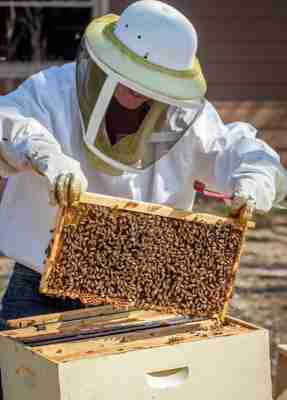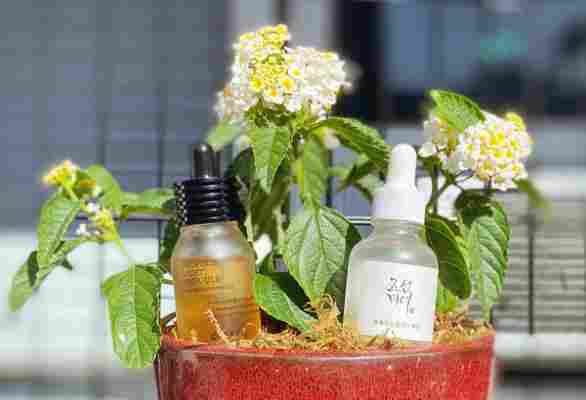COSRX vs. Beauty of Joseon: Which Propolis Serum is Right for You?
How Do I Choose the Best Propolis Products? (with pictures)
Propolis is rapidly becoming a panacea for all ills, from respiratory problems to eczema to wounds. The best propolis product depends to a large extent on what the problem is. Propolis comes in many forms, including tablets, capsules, creams, sprays, liquid and tincture. The best products are harvested from bee hives that are pesticide and fertilizer free and are situated far from polluted areas.

There are four main things to look for in a propolis product. Flavonoids, the concentration of propolis in the end product, dry weight and how long the maturation process has taken are important factors that affect the quality. Flavonoids are responsible for the many beneficial properties and the main determinant of the quality. Their concentration will affect the biological activity of the product. Thus, in order to gain the best possible benefits, the region of production and manner of extraction and processing need to be checked. Unique qualities have been identified in propolis collected in Cuba and Brazil.
Bees create propolis from resin they have collected and mixed with their enzymes. Resin that is contaminant free makes for better quality. Solvents and other toxic chemicals are also sometimes introduced during processing, so the best propolis products are those that have undergone a more natural treatment. If antibiotics, heavy metals or alcohol are present in the final product, the efficacy is reduced. For these reasons, organic propolis is often preferred, although this is not always a guarantee of purity either.
Capsules and tablets are particularly beneficial to those who have respiratory weaknesses, such as smokers, while tincture is useful for clearing mucus from the airways. Sore throats can be eased with propolis in the form of a spray, and wounds can be treated topically with a cream. Other ailments propolis products are considered beneficial for include arthritis, eczema, mouth ulcers and diarrhea. A mouthwash containing propolis is said to aid in the healing of surgical wounds.
Due to the antimicrobial, anti-inflammatory and antibacterial properties prescribed to propolis, conditions such as peptic ulcers and ulcerative colitis are treated by taking supplements. However, fillers like sugar, starch, gluten, and artificial colors and flavors are added to some propolis products taken in this way. Dietary supplements are not always regulated, and there are unscrupulous manufacturers who want to cash on the latest cure all by offering a cheaper price and inferior product.
Propolis
Propolis
Produced by honeybees to construct their hives, t his resin mixture has been topically used to help treat wounds and act as disinfectants. It helps your skin fight against free radical damage and acne-causing bacteria while repairing the skin barrier, softening the skin, and managing sebum production.
COSRX vs. Beauty of Joseon: Which Propolis Serum is Right for You?
Propolis, or “bee glue,” is a sticky resin-like substance made by bees. It is formed from the combination of beeswax and tree sap, and bees use it as a sort of “insulation” in their nests. It’s also an increasingly popular skincare ingredient, driven by trends in K-beauty: it’s included in all sorts of skincare products, including standalone propolis serums like the COSRX Propolis Light Ampoule and the Beauty of Joseon Glow Serum.

Propolis has all sorts of great skin benefits. The main ones are that it has serious anti-inflammatory, anti-microbial, and wound-healing powers — so it’s especially good for acne-prone or irritated skin. It also has tons of naturally occurring flavinoids and polyphenols known to function as antioxidants that can help protect the skin from UV radiation. Given that it also promotes collagen production and helps smooth out wrinkles, it also functions as a great anti-aging ingredient as well.
So! If you don’t have this great ingredient in your skincare arsenal yet, maybe now is the time. But by now there are a ton of different propolis-based products out there — probably the two products I see most frequently recommended are the aformentioned propolis serums from COSRX and Beauty of Joseon. I’ve actually tried both of these recently, and I think they’re both great products, but geared towards different concerns — so, choosing between them shouldn’t be too hard, depending on what your particular motivation for adding a propolis serum is.
Beauty of Joseon Glow Serum: Brightening and Blemish-Reducing, Best for Oily/Combination Skin
I first picked this one up during a major YesStyle sale last year, and I have to say, I love the Beauty of Joseon Glow Serum. In particular, combining this propolis serum with the Summer Fridays CC Me serum in the morning has given me a true non-shiny glow that I haven’t really seen from other products (which I was so excited about, I mentioned it in previous posts here and here). But it’s a great, deceptively simple serum all on its own.
The Beauty of Joseon Glow Serum contains a whopping 60% Propolis Extract along with 2% Niacinamide, one of my favorite skincare ingredients of all time. 2% may not sound like a lot, but studies have shown that 2% Niacinamide is just enough to deliver most of its great skincare benefits. I’d be interested to see if anyone has done any studies on propolis and niacinamide used in tandem — my sense of things, after using quite a bit of this serum (as you can see from the photo!) is that they may have a synergistic effect, especially when it comes to gentle blemish reduction and oil control.
Besides the propolis and niacinamide, the Beauty of Joseon serum includes a few other interesting ingredients as well: turmeric root extract, like propolis, also has anti-inflammatory, anti-microbial, and antioxidant capabilities. Interestingly, this serum also contains a dash of Tamanu Oil, known in skincare nerd circles for its regenerative skin-barrier-supporting powers. Notably I cannot tell at all, aesthetically, that there’s tamanu in this, despite tamanu oil’s distinctive dark green color and spicy scent. It also includes tea tree extract, which I also can’t detect aesthetically, and which my skin seems to tolerate very well despite its pretty dramatic hatred for tea tree oil. The Beauty of Joseon serum even includes a little bit of betaine salicylate, the kinder, gentler version of the more familiar BHA salicylic acid.
All of these ingredients working together make for a really great serum geared towards blemish and oil control. But unlike other serums of that sort, I don’t find this one “drying” or harsh at all — and it’s easy to use in the morning, more likely to boost your SPF than to make your skin more UV-sensitive (the way other anti-blemish treatments often do). It has a really satisfying, gloopy sort of consistency that nonetheless spreads across the skin really beautifully and soaks in nicely. And, as I mentioned before, the glow is noticeable. I’m not sure how, but it does seem to make my skin look at least a little brighter and clearer pretty much instantaneously.
The Beauty of Joseon Glow Serum is normally quite affordable; like most K-Beauty items, you can usually find it on sale somewhere for $20 or less. Right now, you can get it from YesStyle for a mere $11.44 (30ml), which is a hell of a steal, frankly. I’ve almost used up my whole bottle of this stuff, and have already bought a second bottle. I’d be willing to pay $30 for this easily, and am glad I don’t have to.
COSRX Propolis Light Ampoule: Hydrating, Best for Dry or Dehydrated Skin
The COSRX serum is the newer-to-me one of the two, and I was surprised at how different from the Beauty of Joseon serum it is. Not at all in a bad way: the main immediate difference I noticed is that this serum packs a pretty serious hydration punch. The Beauty of Joseon serum is not drying, but hydration is not its main focus. The COSRX Propolis Light Ampoule, on the other hand, provides a really lovely immediate burst of hydration that drier skin types are sure to appreciate.
The COSRX propolis serum (full name: “COSRX Full Fit Propolis Light Ampoule”) is even simpler than the Beauty of Joseon formulation, and even more propolis-heavy: according to the brand, this serum contains 83.5% “Black Bee Propolis Extract” which “repairs, nourishes, and hydrates skin.” Its formulation is even simpler than the Beauty of Joseon one: this product is geared towards providing the benefits of propolis in a super hydrating vehicle.
The most notable ingredients here besides propolis are betaine (moisturizing and soothing), Chinese senna seed extract (hydrating and antioxidant), sodium hyaluronate (hydrating), panthenol (moisturizing and soothing), and arginine (also moisturizing and soothing). So, hydration is really what we’re about here, and it shows in the feel and effects of the product itself.
This COSRX serum is slightly less thick, but still fairly “gloopy,” as compared with the Beauty of Joseon serum. It also spreads and absorbs really nicely. For me, this would actually be a nice and potentially more effective alternative to a hyaluronic acid serum (especially the simpler and more affordable varieties thereof). When I use this one, I like to use it at night as part of a hydration- and anti-aging focused routine.
Unlike the Beauty of Joseon serum, the COSRX Propolis Light Ampoule is conveniently available at Ulta, though it will set you back $28. On the other hand, if you really want to go all-in with the propolis, you can also get COSRX’s Propolis Toner (I have not tried it myself, but have heard only good things from those who have), the Propolis Light Cream, or opt to try minis of all three with the COSRX Honey Glow Kit ($25).
One thing I will mention: if you want a fancier version of something along these lines, do check out the new Farmacy Filling Good Hyaluronic Acid Plumping Serum. I think they may have misstepped a little by calling it a “Hyaluronic Acid” serum — immediately the thought from a lot of skincare aficionados is “Why should I pay $44 for an HA serum when I can get it from The Ordinary for $6.80? But the thing is, Farmacy’s Filling Good is not a hyaluronic acid serum, it’s a hyaluronic acid + propolis (and honey, and royal jelly) + peptide + amino acid etc. etc. serum. So if the COSRX propolis serum appeals to you but you’d like to pump some extra anti-aging and antioxidant stuff in there (and don’t mind paying a few bucks more for it), check out Filling Good.
The Verdict, If We Must Have One
For me, personally, the Beauty of Joseon Glow Serum wins, and I will probably stick to it once I use up the COSRX serum. For my combination skin with easily clogged pores, plus that cool non-shiny glow effect in the morning that I love, Beauty of Joseon really knocks it out of the park. But if your skin is on the dry or dehydrated side, or if you’re looking for a hydrating serum more interesting than just your standard hyaluronic acid, the COSRX Propolis Light Ampoule is a great option.
I will say, I am tempted to “¿Porque no los dos?” this situation and get the COSRX Propolis Synergy Toner to use in tandem with the Beauty of Joseon serum. Will let you know how that goes if and when I do!
Would you like to be notified via email when this blog updates? Sign up below!

